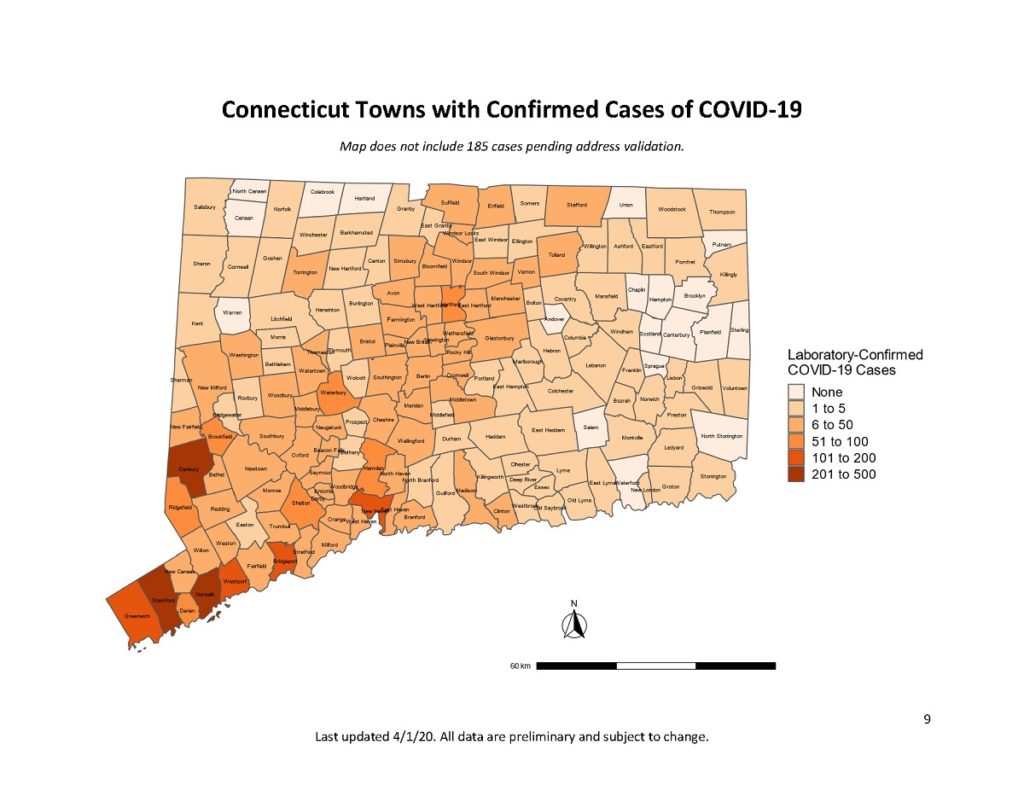
HARTFORD, CT) – As the State of Connecticut continues taking actions in response to the global spread of coronavirus disease (COVID-19), Governor Ned Lamont provided the following updates as of 8:00 p.m. on Wednesday, April 1, 2020:
Data updates on testing in Connecticut
Since yesterday’s update, an additional 429 Connecticut residents have tested positive for COVID-19, bringing the statewide total to 3,557. To date, more than 16,600 tests have been conducted in Connecticut among both state and private laboratories. Approximately 766 patients have been hospitalized. The total statewide total number of fatalities is 85.
Among the new deaths to report is the first pediatric fatality linked to COVID-19 in Connecticut. This was a 6-week-old baby in the Hartford area who was brought unresponsive to a Connecticut hospital late last week and could not be revived. Post-mortem testing confirmed last night that the newborn was COVID-19 positive.
“The passing of this newborn is absolutely heartbreaking,” Governor Lamont said. “We believe this is one of the youngest lives lost linked to COVID-19. This virus attacks our most fragile populations without mercy, and we will definitely see some hard days ahead. This also stresses the importance of staying home and limiting your exposure to other people. Your life and the lives of those you love could literally depend on it. Our prayers are with this family at this difficult time.”
A county-by-county breakdown includes:
| County | Laboratory Confirmed Cases | Hospitalized Cases | Deaths |
| Fairfield County | 1,986 | 359 | 46 |
| Hartford County | 469 | 126 | 11 |
| Litchfield County | 131 | 11 | 1 |
| Middlesex County | 66 | 8 | 2 |
| New Haven County | 611 | 251 | 15 |
| New London County | 29 | 10 | 1 |
| Tolland County | 61 | 1 | 7 |
| Windham County | 19 | 0 | 0 |
| Pending address validation | 185 | 0 | 2 |
| Total | 3,557 | 766 | 85 |
For several additional charts and tables containing more data groups, including a town-by-town breakdown of positive cases in each municipality and a breakdown of cases and deaths among age groups, visit ct.gov/coronavirus.
Governor Lamont signs 20th executive order to mitigate the spread of COVID-19
Governor Lamont today signed another executive order – the 20th since he enacted the emergency declarations – that builds upon his efforts to encourage mitigation strategies that slow down transmission of the virus.
Governor Lamont’s Executive Order No. 7S enacts the following provisions:
- Safe stores mandatory statewide rules: Effective upon the opening of each retail establishment for the first time on April 3, 2020, every retail establishment in the state will be required to take additional protective measures to reduce the risk of transmission of COVID-19 between and among customers, employees, and other persons such as delivery drivers and maintenance people. The order requires the commissioner of the Economic and Community Development to issue mandatory statewide rules prescribing such additional protective measures. Such rules will be mandatory throughout the state and supersede and preempt any current or contemplated municipal order.
- Immediately following Governor Lamont’s signing of this executive order, the Department of Economic and Community Development published the Safe Stores Rules on its website, outlining guidance for retail establishments. All stores must follow these rules beginning April 3.
- 60-day grace period for premium payments, policy cancellations, and non-renewals of insurance policies: Beginning on April 1, 2020 for a period of 60 days, no insurer in Connecticut – including life, health, auto property, casualty, and other types – may lapse or terminate a covered insurance policy because a policyholder does not pay a premium or interest during this time. This grace period is not automatic. To be eligible, affected policyholders must provide additional information acceptable to their insurance carriers.
- Extension of 30-day period of credit for liquor permittees: Modifies state law to permit the maximum period of credit for liquor permittees from certain creditors, including wholesalers and manufacturers, to be 90 days after the date of delivery for all permittees prohibited from engaging in on-premise sales per Executive Order No. 7D.
- Daily payment of certain taxes changed to weekly: Modifies the tax payment requirements for Sportech, the licensee authorized to operate off-track betting in Connecticut, from daily to weekly so that its employees aren’t required to appear in person daily.
- Flexibility to amend Medicaid waivers and state plan: In order to allow continued access to critical services for Medicaid beneficiaries, the order waives public notice and legislative hearing requirements for the duration of the declared public health and civil preparedness emergencies to allow the Department of Social Services to seek expedited approval from the Centers for Medicare and Medicaid Services to submit Medicaid waivers; amend existing Medicaid waivers; submit Medicaid State Plan Amendments that would have required a waiver but for the Affordable Care Act; and obtain relief from various other federal requirements on an emergency basis.
- Relief from certain municipal tax deadlines and collection efforts: Requires municipalities to enact one or both of two options for providing temporary tax forbearance of property tax collection and reduced interest on delinquent tax payments to property owners under certain conditions, including that landlords agree extend commensurate forbearance to commercial, residential, or institutional tenants for the duration of the deferment.
- Allow suspension of in-person voting requirements for critical and time sensitive municipal fiscal deadlines: Allows suspension of certain in-person votes of residents or taxpayers on certain fiscal decisions, in addition to the provisions in Executive Order No. 7I, for fiscal decisions needed to prevent property damage, protect public health and safety, or prevent significant financial loss, provided they comply with all open meeting requirements of Executive Order No. 7B.
- Suspension of reapplication filing requirement for the homeowners’ elderly/disabled circuit breaker tax relief program and for the homeowners’ elderly/disabled freeze tax relief program: Allows recipients of this benefit to receive the benefit for the coming year without recertifying their eligibility.
- Substitution of full inspection requirements pertaining to October 1, 2020 grand list revaluations: Allows 34 municipalities to continue with their scheduled 2020 revaluations, which are started up to a year in advance. The statute allows for Data Mailer Questionnaire to be mailed to the property owner when access is unobtainable; this eliminates having to request access, and allows for the revaluation to be completed via questionnaire.
- Extension of deadline to file income and expense statement to August 15: Allows taxpayers additional time to complete their income and expense statements.
- Suspension of non-judicial tax sales: Suspends foreclosures through non-judicial tax sales until 30 days after the end of the COVID-19 emergency.
| **Download: Governor Lamont’s Executive Order No. 7S |
Governor Lamont announces medical surge plan in collaboration with Connecticut’s long-term care facilities
Governor Lamont today announced that his administration is collaborating with Connecticut’s long-term care facilities on a medical surge plan that will involve moving some residents and the creation of dedicated spaces for residents who are COVID-19 positive.
As the number of individuals who are diagnosed with COVID-19 rises, the health care system will be stretched to extremes. Compounding this challenge is the fact that the elderly population will be at greater risk when diagnosed as being positive for COVID-19.
Nursing homes are an essential component of the medical surge plan. It includes the following options:
- Separation of COVID-19 positive residents: Anyone diagnosed as COVID-19 positive in a hospital and later admitted to a nursing home will be monitored and assessed for 14 days in an area that only has other COVID-19 positive residents. Anyone admitted who is negative for COVID-19 will be housed with other residents who are negative, as a mitigation measure.
- Dedication of space: Existing nursing homes will dedicate specific units that will group together residents who have been diagnosed as being COVID-19 positive, where applicable.
- Conversion of existing nursing homes: Residents of some long-term care facilities who either test negative for COVID-19 or display no symptoms will be able to voluntarily transfer to facilities where there are no COVID-19 positive residents. At the same time, some facilities will be converted to only house individuals who are COVID-19 positive and dedicate their new admissions to individuals who have been diagnosed positive. This concept also includes a facility who has a dedicated entrance to a unit within the structure that can physically isolate all care and services from normal operations. For existing nursing home conversions, individuals who are not positive for COVID-19 and/or asymptomatic will all be voluntarily transferred to the receiving destination prior to that facility accepting any individuals who are COVID-19 positive.
- Development of new alternate care sites: New spaces are identified that are currently vacant and in several cases have been vacated through recent nursing home closures. These sites would be licensed as chronic and convalescent nursing homes and the request would be made to the federal Centers for Medicare and Medicaid (CMS) for an 1135 waiver for rapid certification. These alternate care sites, too, would be dedicated to the care of individuals positive for COVID-19. Alternate care sites developed will be inspected and approved by the Department of Public Health (DPH). DPH can also provide support regarding access to and moving of equipment, staffing and logistics.
The Department of Social Services and the Office of Policy and Management have determined a specific payment rate for options 3 and 4. Options 3 and 4 would also require providers to submit a written proposal to DPH prior to approval that will need to address staffing patterns, equipment needs and detail system supports that will be provided such as environmental and food services, among others.
Options 3 and 4 will create additional bed space for 1,175 people. The following nursing homes have been identified as potential sites:
Option 3 (conversion of existing facilities)
- Evergreen Health Care (Stafford Springs, 180 Beds)
- Sharon Health Care (Sharon, 88 Beds)
- Touchpoints of Farmington (Farmington, 120 Beds)
- Touchpoints of Bloomfield (Bloomfield, 30 Beds)
- Greenwich Woods (Greenwich, 217)
- Total beds in option 3: 635
Option 4 (new alternate sites)
- Old Greenwich Civic Center (Greenwich, 90 Beds)
- Silver Hill Hospitals (New Caanan, 90 Beds)
- Westfield (Meriden, 120 Beds)
- Green Springs (East Hartford, 120 Beds)
- Vacant Nursing Home in Region 5 (120 Beds)
- Total beds in option 4: 540
The following is the list of nursing homes in Connecticut with residents who have tested positive for COVID-19 as of April 1, 2020 at 11:00 a.m.:
| Town | Nursing Home |
| Bloomfield | Bloomfield Healthcare Center |
| Bloomfield | Caleb Hitchcock Health Center |
| Bloomfield | Touchpoints at Bloomfield |
| Bridgeport | Jewish Living Center |
| Canton | Cherry Brook Health Care Center |
| Danbury | Glen Hill Center |
| East Haven | Whispering Pines Rehabilitation and Nursing Center |
| Greenwich | Greenwich Woods Rehabilitation |
| Greenwich | Nathaniel Witherell |
| Guilford | Guilford House |
| Milford | Golden Hill Rehab Pavilion |
| Naugatuck | Glendale Center |
| New Haven | Grimes Center |
| New London | Harbor Village Health and Rehabilitation |
| Newington | Bel-Air Manor |
| Portland | Portland Care and Rehabilitation |
| Rocky Hill | Apple Rehab Rocky Hill |
| Seymour | Shady Knoll Health Center |
| Sharon | Sharon Health Care Center |
| Shelton | Apple Rehab Shelton Lakes |
| Shelton | Bishop Wicke Health and Rehabilitation |
| Shelton | Gardner Heights Health Care Center |
| Stafford Springs | Evergreen Health Care Center |
| Stamford | St. Camillus Center |
| Suffield | Suffield House |
| Torrington | RegalCare at Torrington |
| Torrington | Wolcott Hall |
| Trumbull | Maefair Health Care Center |
| Waterbury | Abbott Terrace Health Center |
| Waterbury | RegalCare at Waterbury |
| Waterbury | Waterbury Gardens Nursing and Rehabilitation |
| Waterford | Bayview Health Care |
| Wilton | Wilton Meadows |
| Windsor | Kimberly Hall North |
| Windsor | Windsor Health and Rehabilitation |
| Woodbridge | The Willows |
Connecticut National Guard deploys additional medical capacity at Middlesex Hospital, SCSU, and WCSU
The Connecticut National Guard today continued efforts to deploy additional medical capacity at several sites throughout the state:
- A Connecticut Department of Public Health mobile field hospital was set up at Middlesex Hospital in Middletown. This is the third of these units to be deployed at hospitals across the state. Last week, the Guard deployed two other of these units at Saint Francis Hospital in Hartford and Danbury Hospital.
- The Guard today also deployed a 250-bed medical station provided by FEMA at the Moore Field House on the campus of Southern Connecticut State University in New Haven.
- In addition, the Guard today began preparations to set-up 300 beds of additional medical capacity from the Connecticut Division of Emergency Management and Homeland Security at the O’Neill Center on the campus of Western Connecticut State University in Danbury. Those beds will be assembled on Thursday.
Governor Lamont announces creation of 4-CT charitable organization to unite donors with Connecticut programs responding to COVID-19
Recognizing the considerable demand on resources the COVID-19 public health emergency is having on nearly every aspect of life across the state, a group of Connecticut-based philanthropists today announced that they have established a charitable organization to raise new support for the state’s nonprofit organizations that are serving those impacted by the pandemic.
The Connecticut COVID-19 Charity Connection – also known as 4-CT – is an independent, 501(c)3 organization with the mission of bolstering the resources available to support the state’s frontline providers who are serving all areas impacted by the crisis. 4-CT will provide financial support to ensure their services can meet increased demand and have a positive impact. In announcing its launch, the charity has already raised $10 million from generous donors and is seeking to significantly increase these efforts in the coming weeks and months to further support to the state’s nonprofit community.
Governor Ned Lamont, recognizing the urgency of addressing the impact of the crisis on communities across the state, said the creation of this charity is an example of Connecticut ingenuity and generosity, and applauded the efforts of those who sought to bring it to fruition.
“I’m grateful to our community foundations, United Way of Connecticut, and the individual donors who support the work of nonprofits that provide critical services across our state every day – and during this crisis,” Governor Lamont said. “4-CT will expand the ranks of these philanthropic partners supporting the nonprofits on the frontlines.”
For more information, read the press release issued today by Governor Lamont.
State Parks to reduce visitor capacity during COVID-19 pandemic
Pursuant to Executive Order No. 7R, which Governor Lamont signed Tuesday, the Connecticut Department of Energy and Environmental Protection (DEEP) today announced that it will be enforcing stricter measures to support safe, solitary enjoyment of outdoor spaces at all state parks in an effort to maintain social distancing. This include plans to limit parking capacity at certain parks to manage visitor levels.
While state parks remain open for solitary recreation, the agency is closely monitoring park visitorship and is closing parking lots when lots become full and lowering parking thresholds where necessary. In some locations, additional visitors have been observed parking outside of park entrances that have been closed for capacity and walking in, which undermines DEEP’s ability to maintain manageable visitor levels. The executive order Governor Lamont signed gives DEEP the authority to impose penalties on individuals who enter parks after they have reached capacity.
Those considering visiting State Parks are encouraged to take these steps:
- Check the Connecticut State Park’s Twitter account at @CTStateParks, where real-time information on park closures is announced;
- Stay home if you’re not feeling well; and
- Rather than traveling to the more popular spots, discover a new place that is less traveled. Check out DEEP’s website for a list of every State Park and use the hashtag #CTTrailsLessTraveled on social media.
For more information, read the press release issued today by DEEP.
Connecticut State Colleges and University system donates PPE to facilities across the state
Higher education institutions from within the Connecticut State Colleges and University (CSCU) system have been making donations of PPE from their facilities to local hospitals to assist with emergency response.
“There are so many ways each of us can help out in some way, and I applaud these higher education institutions for utilizing their resources and giving them to our local hospitals, which are in need of this equipment at this time,” Governor Lamont said.
PPE donations from each CSCU institution to date includes:
- Central Connecticut State University: Total Gloves Combined, 26,000; Total Masks Combined, 430
- Eastern Connecticut State University: Total Masks Combined, 1,200
- Western Connecticut State University: Total Gloves Combined, 400; Total Masks Combined, 1,550; Total Gowns Combined, 174
- Charter Oak State College: Total Gloves Combined, 1,800; Total Masks Combined, 21
- Tunxis Community College: Total Gloves Combined, 15,600; Total Masks Combined, 838; Total Eye Protection Combined, 48; Total gowns, 60
- Middlesex Community College: Total Gloves Combined, 25,300; Total Masks Combined, 560
- Norwalk Community College: Total Gloves Combined, 15,000; Total Masks Combined, 919; Total Gowns Combined, 130; Total Alcohol Prep Pads Combined, 1,800; Total Ventilators Combined (on loan), 3
- Three Rivers Community College: Total Gloves Combined, 5,700; Total Masks Combined, 2,000 Total Gowns Combined, 189
- Northwestern Connecticut Community College: Total Gloves Combined, 15,100; Total Masks Combined, 1,890; Total Gowns Combined, 211
- Manchester Community College: Total Ventilators Combined, 6
- Housatonic Community College: Total Gloves Combined, 300; Total Masks Combined, 200; Total Gowns Combined, 120
- Naugatuck Valley Community College: Total Gloves Combined, 28,400; Total Masks Combined, 200; Total Gowns Combined, 510
- Quinebaug Valley Community College: Total Gloves Combined, 23,100; Total Masks Combined, 525; Total Gowns Combined, 85
- Capital Community College: Total Gloves Combined, 27,700; Total Masks Combined, 1,012; Total Gowns Combined, 406
- CSCU System Totals: Gloves: 184,400; Masks: 11,345; Gowns: 1,885; Ventilators: 9
Providing information to Connecticut residents
For the most up-to-date information from the State of Connecticut on COVID-19, including an FAQ and other guidance and resources, residents are encouraged to visit ct.gov/coronavirus.
Individuals who have general questions that are not answered on the website can also call 2-1-1 for assistance. The hotline is available 24 hours a day and has multilingual assistance and TDD/TTY access. It intended to be used by individuals who are not experiencing symptoms but may have general questions related to COVID-19. Anyone experiencing symptoms is strongly urged to contact their medical provider.




